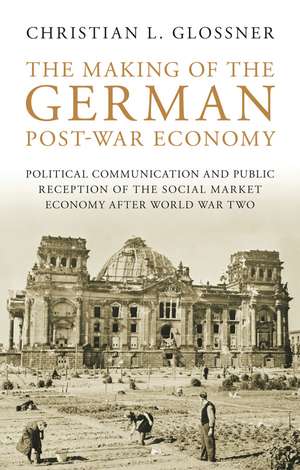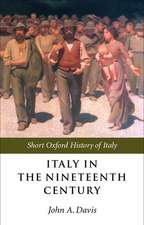The Making of the German Post-War Economy: Political Communication and Public Reception of the Social Market Economy After World War Two
Autor Christian L. Glossneren Limba Engleză Paperback – 29 noi 2012
| Toate formatele și edițiile | Preț | Express |
|---|---|---|
| Paperback (1) | 251.83 lei 6-8 săpt. | |
| Bloomsbury Publishing – 29 noi 2012 | 251.83 lei 6-8 săpt. | |
| Hardback (1) | 774.20 lei 6-8 săpt. | |
| I. B. Tauris & Company – 28 feb 2010 | 774.20 lei 6-8 săpt. |
Preț: 251.83 lei
Preț vechi: 305.76 lei
-18% Nou
Puncte Express: 378
Preț estimativ în valută:
48.20€ • 52.38$ • 40.52£
48.20€ • 52.38$ • 40.52£
Carte tipărită la comandă
Livrare economică 21 aprilie-05 mai
Preluare comenzi: 021 569.72.76
Specificații
ISBN-13: 9781780764214
ISBN-10: 1780764219
Pagini: 320
Ilustrații: 1 map, 3 figures
Dimensiuni: 138 x 216 x 28 mm
Greutate: 0.41 kg
Editura: Bloomsbury Publishing
Colecția I.B.Tauris
Locul publicării:London, United Kingdom
ISBN-10: 1780764219
Pagini: 320
Ilustrații: 1 map, 3 figures
Dimensiuni: 138 x 216 x 28 mm
Greutate: 0.41 kg
Editura: Bloomsbury Publishing
Colecția I.B.Tauris
Locul publicării:London, United Kingdom
Notă biografică
Christian L. Glossner is Teaching Fellow and Assistant Lecturer in Political Economy and European History at the University of Oxford. He previously held a Europaeum Research Fellowship at the Institut Universitaire de Hautes Etudes Internationales (HEI) in Geneva and worked for the Directorate-General for Economic and Financial Affairs (ECFIN) of the European Commission in Brussels. He is a graduate from the Universite de Fribourg as well as the London School of Economics and Political Science (LSE) and received his D.Phil. on economic theory and political history from the University of Oxford.
Cuprins
Introduction Part I: Conception and Communication Chapter 1: Academic Concepts between Neo-Liberalism and Neo-Socialism 1.1. The Freiburg Circles and Neo-Liberalism 1.2. The Freiburg School and Ordo-Liberalism 1.3. The Cologne School and Social Market Economics Chapter 2: Political Considerations between Programmatic Intention and Pragmatic Imperative 2.1. The Social Democratic Party and Liberal Socialism 2.2. The Christian Democratic Union/Christian Social Union and Social Liberalism Part II: Politics and Public Opinion Chapter 3: 1945/1946 - Stupor and Search for Direction Chapter 4: 1947 - Disillusion and Disappointment Chapter 5: 1948 - Aspiration and Apprehension Chapter 6: 1949 - Contentment and Confidence Conclusion












